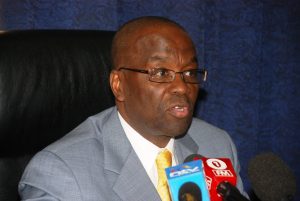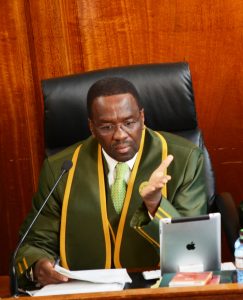
In a ‘Circular on Judicial Dress Code and Address,’ of August 23, 2011, the then Chief Justice (CJ), Dr. Willy Mutunga, directed judicial officers to discard ceremonial wigs that were part of their dress code.
Further, the Circular instructed that Judges in Kenya should no longer be addressed as ‘My Lady’ or ‘My Lord’ and instead, they were to be addressed in English as ‘Your Honour’ or in Swahili as ‘Mheshimiwa’.
Considered as a reformist, thanks to his participation in activism during the tenure of former President Daniel arap Moi, the CJ changed the robes of judges to green and gave magistrates the leeway to choose to wear robes or not, while each court was placed at will to determine the dress code of the members of the Bar appearing before them.

The reformist approach and the so-called activism, espoused by Mutunga has since been overturned with the restoration of the traditional albeit intimidating red and black robes that are donned by Supreme Court Judges. This was done after Chief Justice, David Maraga, assumed office in 2016.
With the actualization of devolved governments in 2013, legislation in County Assemblies was a new take with Kenyans having been used to councilors under the Local Governments Act.
Legislative transactions in the unicameral National Assembly were previously an esoteric undertaking left for the privileged in Kenya social strata.
With exposure to lawmaking at the County Assemblies, Kenyans are fairly aware of the process of parliamentary business that is deeply steeped in the British model common in the Commonwealth countries.
With the parliamentary jargon like division, question negative, votes and proceedings, question proposed’ having coded meaning that can be substituted with direct and simple terms, questions have been raised on whether it is time for partial departure from the ‘Commonwealth’ tradition.
Author, Rufus Waples, in the preface of ‘A Handbook on Parliamentary Practice’ avers that the ‘the law of order in deliberative assemblies is not dependent upon arbitrary rules and meaningless forms, as has been supposed, but it is founded upon reason and established precedent.’
While traditions and practices of parliaments like dress code are observed, the lingering question is how long the modus operandi will last, particularly in regard to global digitization, the jargon and procedural steps in transacting business in the Regional August Houses. In retrospect, parliamentary business was so secretive before 1771 and radical publisher, William Cobbett, was convicted and handed a vindictive sentence for publishing Parliamentary Debates as a supplement to his Political Register publication in 1802.
To demystify law-making that eventually affects the electorate, County Assemblies are at crossroads to either stick to the ‘traditions and practices’ path or simplify their way of transacting business considering that the County Assembly Services Act accords them, the chance to innovate in their approaches.
The regional legislatures must tread carefully when making innovations, but obvious concerns like geographical locations will come into play. It will be foolhardy to enforce the dress code. For instance in Kajiado County Members of the County Assembly (MCAs) and the staff must be in a black suit and a tie when they go for Bunge Mashinani in Magadi, where temperatures of more than 40 degrees centigrade are experienced, that could result into a heatstroke; a health risk.
The Senate has already set the cue by meeting only in the afternoons unlike the National Assembly that convenes on Wednesdays in the morning. Is that not a justifiable ‘break’ from the traditions? Some County Assemblies meet on Tuesdays and Wednesdays but not at all on Thursdays. In the same way, rigidity premised on traditions could be eased-off so that the electorates understand the process of the legislature in the simplest way.
Through mobile sittings in the wards, County Assemblies such as Kajiado, Kirinyaga, Laikipia, West Pokot, Nyamira, Isiolo and Machakos have transacted their business well but the lingering question is, does the public understand the steps therein? The Willy Mutunga-led reformist Judiciary should rouse County Assemblies to be innovative on connecting with the electorate to ‘touch base.’
With devolution and diversity in Kenya, it is time that nationhood was embraced and felt by ordinary Kenyans through the regional legislatures and the vision should not be to radically discard British traditions but give priority to homegrown ways and still maintain the parliamentary standards.
The legislative steps and language should be demystified and Hansard Guides should be formulated in a way that makes it easy to follow parliamentary business.
While expensive wigs serve as a symbol of authority alongside the mace, Kenyans have traditional symbols such as colobus monkey headgear of the Meru, ebony clubs and sticks of the Maasai, Ekicholong of the Turkana, sheepskin headgear of Kikuyu elders, bows and arrows of the Akamba and many artifacts that can still symbolize authority.
The emblems in the County Governments are a testimony of how our rich culture can be customized to suit Kenyan environment, culture and customs, instead of over-borrowing traditions from the West.
The recent approach of members of National Assembly using iPads to access parliamentary business is a signal that the all-important Order Paper is no more.
It is time that the legislature prepared for the emerging revolutionary trends and ride with the flow and still maintaining its standards.
Let us recall that Kenyans were reluctant to embrace digital migration in television until they had to be forced. The legislature should be better advised and prepare for the imminent paradigm shift.
By Wanyoike Njuguna





